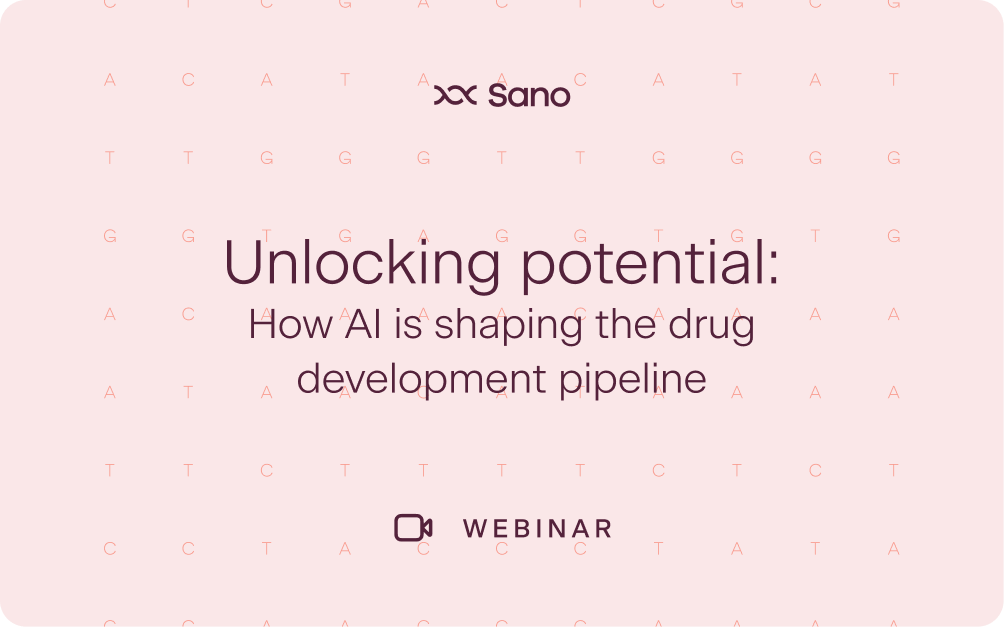Webinar recap: Unlocking potential - How AI is shaping the drug development pipeline

This webinar focused on the potential of artificial intelligence (AI) in drug development, particularly within the realms of precision medicine. Hosted by Charlotte Guzzo, COO of Sano, the session featured insights from top industry experts who discussed their personal journeys at the intersection of technology and healthcare, the challenges of integrating AI into drug development, and the cutting-edge innovations their companies are pioneering.
The link to the full webinar is here; a brief summary is below for easy reference.
About the speakers

Charlotte Guzzo
As Co-founder and COO of Sano Genetics, Charlotte Guzzo is driving the company’s mission towards personalised medicine. Her work focuses on enhancing patient experience in medical research through digital solutions and at-home testing. Before joining Sano, she researched childhood cancer origins at the Wellcome Sanger Institute and worked in risk management at JPMorgan Chase.

Parker Moss
As the Executive Vice President of Corporate Development at Exscientia, Parker Moss spearheads strategies in precision medicine with a focus on oncology. His past roles include Chief Partnerships Officer at Genomics England and leadership positions in healthcare technology. His work at Exscientia supports AI-driven development of targeted medicines.

Margo Georgiadis
Margo Georgiadis is the CEO of Montai Health, where she leverages AI to create medicines for chronic diseases. A former leader at Ancestry and Google, Margo is known for her role in tech and genomics transformation. She promotes women in STEM and serves on several boards, driving forward innovations in healthcare technology.

Guillermo Del Angel
Guillermo Del Angel, the Executive Director and Rare Disease Therapy Area Head at AstraZeneca's Center for Genomics Research, utilises his expertise in computational biology and data science to improve genomics-based treatments. With experience at Alexion Pharmaceuticals and the Broad Institute, he focuses on integrating advanced data analysis and genomics into patient care.
Highlights from the webinar
Personal journeys to the intersection of technology and healthcare
The webinar emphasised the significant role of AI in reshaping the landscape of precision medicine and drug development. Panellists shared personal narratives, highlighting a shift from traditional careers to biotechnology and precision medicine due to personal experiences with diseases affecting their loved ones. This transition underlined a common theme of leveraging technological expertise to innovate and improve outcomes in healthcare. For instance, Parker spoke about his transition from telecommunications to precision medicine after his daughter's cancer diagnosis. His story underscored the motivation to use AI for developing targeted therapies in oncology. Similarly, Margo detailed her journey from the technology sector, including time at Google, to healthcare, driven by the desire to apply AI in designing clinical trials and developing treatments for chronic diseases.
Challenges and innovations in AI-driven drug discovery
The group extensively discussed the challenges and innovations associated with AI-driven drug discovery, specifically focusing on the integration of AI into various stages of the drug development pipeline and how it can mitigate the traditional challenges of this sector.
Challenges discussed include:
- Data scarcity and quality: A significant challenge highlighted was the scarcity and quality of data needed to train AI models effectively. For rare diseases, as mentioned by Guillermo, the data can be particularly sparse, making it difficult to train robust models. This scarcity extends to chemical data as well, where the vastness of chemical space vastly outstrips the available chemical libraries.
- Integration with existing systems: The integration of AI tools with traditional drug development processes poses significant logistical and technical challenges. For instance, transitioning from AI models to practical applications requires not just technological solutions but also changes in regulatory, clinical, and operational frameworks.
- Computational demands: The computational power required to process large datasets and run complex simulations is enormous. As Parker discussed, generative AI and other advanced AI methods demand substantial computational resources, which can be a limiting factor in their deployment.
Innovations discussed include:
- Generative AI for drug targeting and design: Parker Moss described the use of generative AI at Exscientia to optimise drug targets and candidates more efficiently, which has the potential to drastically reduce the timelines and costs associated with drug development. This technology allows for pre-screening of drug compounds, ensuring that only the most promising candidates are synthesised and tested.
- AI in precision matching of chemistry and biology: Margo discussed how Montai Health uses AI to match complex biological pathways with potential treatments. This approach is particularly relevant for chronic diseases, where understanding and modulating biological pathways can lead to breakthrough therapies.
- Automation and efficiency in laboratories: A major innovation is the automation of laboratory processes. As Parker pointed out, the future of drug discovery is not just about AI in computational models but also about automating synthesis and testing processes in the lab. This can lead to faster cycles of iteration and learning, improving both the efficiency and effectiveness of drug discovery.
- Advanced screening techniques: AI-driven methods are enabling more sophisticated screening techniques that can handle vast chemical libraries and biological datasets. These techniques can predict drug efficacy and safety profiles earlier in the drug development process, potentially reducing the high rates of failure in later stages.
- Machine learning in genomic data interpretation: Guillermo highlighted the use of machine learning to interpret genomic data, particularly in rare diseases. This application of AI helps in faster and more accurate diagnosis and patient identification, which is crucial for effective treatment development.
Summary
The webinar explored the potential of AI in medicine, particularly focusing on precision medicine and drug discovery. Speakers shared their personal motivations and professional journeys, illustrating a convergence of technology and healthcare aimed at significantly improving patient outcomes. The challenges of AI integration into existing systems and the innovative approaches being developed to overcome these hurdles were also discussed. The overarching theme was a strong optimism about AI's role in future medical breakthroughs, underscoring the necessity of continuous innovation and collaboration in the field.

